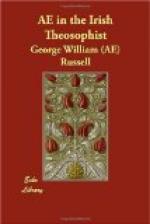—April 15-May 15, 1897
The Age of the Spirit
I am a part of all that I have met:
Yet all experience is an arch wherethro’
Gleams that untraveled world .....
....... Come, my friends,
’Tis not too late to seek a newer world.
—Ulysses
We are no longer children as we were in the beginning. The spirit which, prompted by some divine intent, flung itself long ago into a vague, nebulous, drifting nature, though it has endured through many periods of youth, maturity, and age, has yet had its own transformations. Its gay, wonderful childhood gave way, as cycle after cycle coiled itself into slumber, to more definite purposes, and now it is old and burdened with experiences. It is not an age that quenches its fire, but it will not renew again the activities which gave it wisdom. And so it comes that men pause with a feeling which they translate into weariness of life before the accustomed joys and purposes of their race. They wonder at the spell which induced their fathers to plot and execute deeds which seem to them to have no more meaning than a whirl of dust. But their fathers had this weariness also and concealed it from each other in fear, for it meant the laying aside of the sceptre, the toppling over empires, the chilling of the household warmth, and all for a voice whose inner significance revealed itself but to one or two among myriads.
The spirit has hardly emerged from the childhood with which nature clothes it afresh at every new birth, when the disparity between the garment and the wearer becomes manifest: the little tissue of joys and dreams woven about it found inadequate for shelter: it trembles exposed to the winds blowing out of the unknown. We linger at twilight with some companion, still glad, contented, and in tune with the nature which fills the orchards with blossom and sprays the hedges with dewy blooms. The laughing lips give utterance to wishes—ours until that moment. Then the spirit, without warning, suddenly falls into immeasurable age: a sphynx-like regard is upon us: our lips answer, but far from the region




